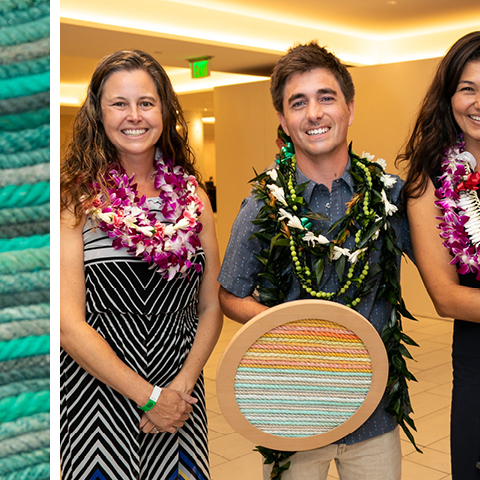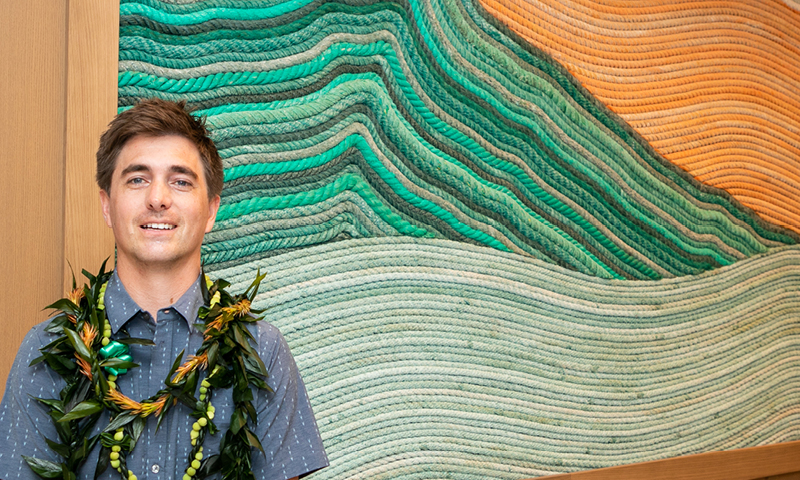Choisissez une langue

Le trésor des déchets : entretien avec l’artiste activiste Ethan Estess
Lignes de pêche commerciale. Sacs en plastique. Microplastiques.
L'artiste Ethan Estess transforme les déchets en une sorte de trésor (révélateur) : des installations artistiques à grande échelle qui sensibilisent à l'impact de la pollution croissante des océans sur les créatures marines et les humains.
Racines océaniques
Élevé sur les rives de Santa Cruz, en Californie, ce scientifique marin s'est d'abord essayé à l'art après que son hobby, la fabrication de planches de surf, a été interdit à l'université. Ethan a ensuite combiné son amour pour l'océan en réutilisant des déchets provenant de ses eaux.
"J'ai réalisé que je pouvais raconter des histoires à travers des matériaux récupérés et amener les gens à se préoccuper de l'environnement,". "Cela a été un moment décisif pour moi."
Comme le pense Ethan, le rôle de l'artiste n'est pas d'apporter des réponses, mais d'amener les gens à se poser des questions.
"J'aime essayer d'attirer les gens avec des travaux qui sont visuellement attrayants et "beaux", puis, en y regardant de plus près, les gens se demandent : "Attendez, de quoi est-ce fait ? D'où cela vient-il ? Pourquoi est-ce un problème ? Ce genre de questionnement et de choc émotionnel - la réaction "Oh, c'est beau, mais aussi Oh, c'est triste" - c'est mon esthétique et cette juxtaposition de matériaux et de beauté," Ethan a déclaré.

Tomber amoureux d'Oahu
Lorsqu'il est venu pour la première fois à Oahu, Ethan était comme les touristes - juste un surfeur profitant des vagues incomparables (et, comme il le dit, humiliantes). Les choses ont changé lorsqu'il a décidé de se porter volontaire pour nettoyer une plage avec Sustainable Coastlines Hawaii lors d'un voyage de surf régulier.
"Faire du bénévolat avec des milliers de personnes lors de ces grands nettoyages de plages m'a vraiment ouvert les yeux sur l'ampleur du problème de la pollution plastique dans nos océans," a déclaré Ethan. "J'ai appris que si je jetais une bouteille à Santa Cruz, avec les courants, il y a de fortes chances qu'elle finisse sur les côtes hawaïennes."
Aujourd'hui, l'une des principales déclarations qu'Ethan espère faire à travers son travail concerne l'origine de nos produits de la mer.
"Lorsque l'on parle de pollution plastique, on pense aux pailles, aux bouteilles et aux mégots de cigarettes," a-t-il déclaré. "Il s'agit là de problèmes majeurs, mais d'un autre côté, de nombreux débris proviennent de pêcheries commerciales exploitées de manière irresponsable. Une fois que l'on s'est renseigné, on s'aperçoit que la meilleure solution est de soutenir les pêcheries locales durables."
Faire des vagues à Outrigger Reef
Le dernier projet d'Ethan, une peinture murale intitulée "Coming Home," a été récemment installée dans le hall de l'Outrigger Reef Waikiki Beach Resort. Utilisant des matériaux offerts par le Center for Marine Debris Research et avec le soutien de Sustainable Coastlines Hawaii, l'œuvre représente tout ce que le travail d'Ethan inspire. Et elle n'aurait pas été possible sans le soutien de la communauté locale d'Oahu.
"La première chose que j'ai apprise en travaillant dans les îles, c'est que ce n'est pas un endroit très grand, et qu'il faut donc marcher avec respect," Ethan a partagé. "C'est fou de voir à quel point les gens m'ont soutenu, et que quelque chose d'aussi simple que de faire du bénévolat dans une association locale alors que je n'étais qu'un touriste m'a ouvert à ce problème. Et maintenant, j'ai plus d'amis à Oahu qu'en Californie."
